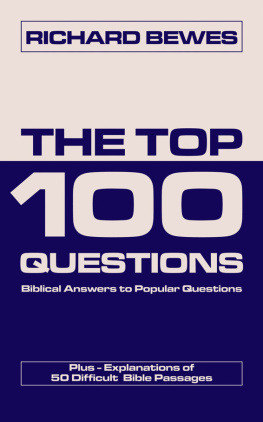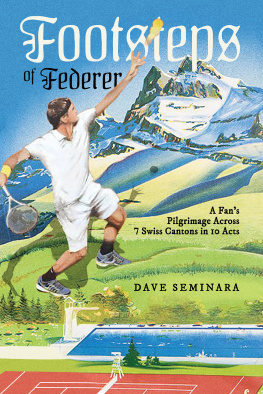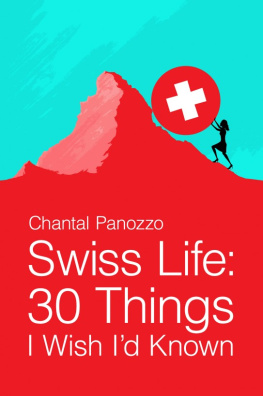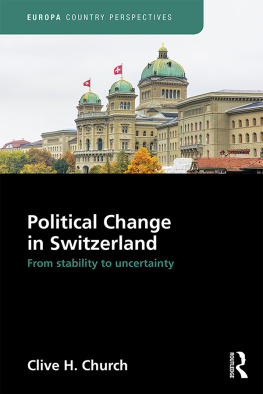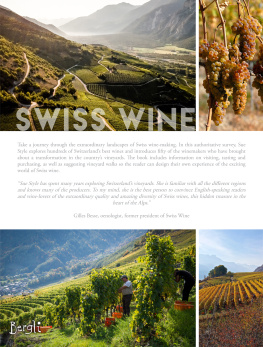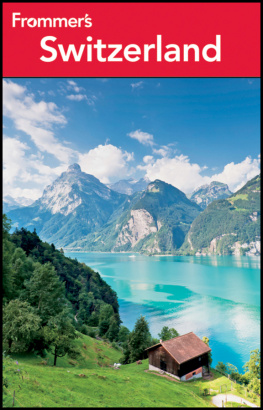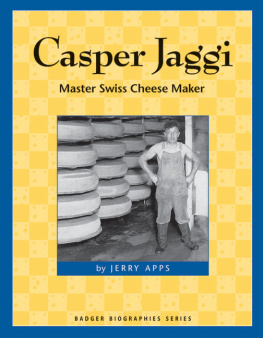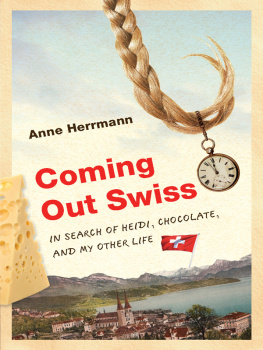Praise for
SWISS WATCHING
A FINANCIAL TIMES BOOK OF THE YEAR
We all know that Switzerland gave us the world cuckoo clocks, triangular chocolate and penknives, but how about the Toilet Duck, Velcro and LSD? Europes landlocked island is a great subject for a cultural anthropologist and Bewes, manager of an English language bookshop in Bern, is a perfect guide.
Financial Times
A journalist who now lives in Switzerland, Bewes is a well-qualified guide to a country that, although familiar, requires expertise to understand... Bewes reveals how Switzerland is riddled with contradictions... Informative and entertaining.

Harry Ritchie, Mail on Sunday
Bewes has an engagingly light and comic touch. The narrative moves between subjects as diverse as graffiti and recycling with ease, and as the book is divided into sections, its easy to dip in and out of. This isnt a read to change your life, but it will make you smile and perhaps think a little more deeply about cultural stereotypes.
Clover Stroud, Sunday Telegraph
Its a real page turner, a treasure trove. Absolutely jam-packed with fascinating facts that really got me thinking.
Margaret Oertig-Davidson, author of Beyond Chocolate
This book is excellently researched and reads wonderfully well. As well as being packed with material, it contains a heart-warming sense of irony [It] is in a league of its own.
Jrg Mller, Swiss Review
Everything you wanted to know about Switzerland. Not just a travel book, Swiss Watching is a no-stone-left-unturned exploration of what makes (and has made) this enigmatic country tick.
Peter Kerr, author of Snowball Oranges
Diccon Bewes has written the ideal book for Swiss national day. As an Englishman he has the necessary ironic distance, but he knows the object of his enquiry, perhaps better than many a Swiss patriot... Diccon Bewes background as a travel writer gives the book a special flair: the authors observations are insightful, with a sure eye for comic or exotic detail, and described with typically English humour.
Artur K. Vogel, Der Bund
He is one of those Anglo-Saxon authors who describe foreign countries with a mix of loving irony and a well-trained eye for eccentricity.
Ralph Poehner, Die Zeit
At last! A book about Switzerland that cuts through the stereotypes in an honest and entertaining exploration of this unique corner of Europe. Swiss Watching manages to combine impeccable research with humour and wry observation.
Matthew Beattie, Swiss News
With Swiss Watching Diccon Bewes has achieved a book that holds surprising insights about the Swiss, and not just for foreigners.
Jonathan Spirig, Berner Zeitung
A fascinating book, teeming with facts and figures, and anecdotes which even the Swiss dont know. A journalist, anthropologist and satirist, Diccon Bewes gives us a book that is serious without being academic and funny without ever falling into caricature.
Michel Guillaume, LHebdo
SWISS WATCHING
For Gregor
SWISS WATCHING
INSIDE THE LAND OF MILK AND MONEY
DICCON BEWES

This second revised edition first published by
Nicholas Brealey Publishing in 2012
First edition published in 2010
Reprinted 2010 (three times), 2011 (twice)
|
|---|
Carmelite House | Hachette Book Group |
50 Victoria Embankment | 53 State Street |
London EC4Y ODZ | Boston, MA 02109, USA |
Tel: 020 3122 6000 | Tel: (617) 523-3801 |
www.nicholasbrealey.com
www.dicconbewes.com
Diccon Bewes 2010, 2012
The right of Diccon Bewes to be identified as the author of this work
has been asserted in accordance with the Copyright, Designs and
Patents Act 1988.
ISBN 978-1-85788-587-3
eISBN 978-1-47364-494-6
British Library Cataloguing in Publication Data
A catalogue record for this book is available from the
British Library.
All rights reserved. No part of this publication may be reproduced, stored in a retrieval system, or transmitted, in any form or by any means, electronic, mechanical, photocopying, recording and/or otherwise without the prior written permission of the publishers. This book may not be lent, resold, hired out or otherwise disposed of by way of trade in any form, binding or cover other than that in which it is published, without the prior consent of the publishers.

Printed in the UK by Clays Ltd, St Ives plc.
A WORD ABOUT NAMES
In a quadrilingual country, theres bound to be some confusion over place names. For example, the city called Geneva in English is known as Genve, Genf, Ginevra and Genevra in the different languages of Switzerland. Luckily, Geneva is an extreme case of multilingualism; other places in Switzerland make do with two or three variations rather than five.
Unlike countless examples in Italy, most Swiss cities escaped the English habit of anglicising the names. In general the British preferred French to German, so its Neuchtel not Neuenburg (and certainly never Newcastle), Valais not Wallis, and Lucerne not Luzern. I have stuck to that rule throughout the book, except where the German version has always been used, such as Zug, or where its become old-fashioned to use French for somewhere in the German-speaking part of Switzerland.
The Swiss tourist board and most English guidebooks now use the German spellings for Bern and Basel, possibly because its the majority language in both cities. Similarly, Aargau, Thurgau, Graubnden and St Gallen have replaced the hopelessly antiquated Argovia, Thurgovia, Grisons and Saint Gall, all of which are rarely seen in modern publications. Its not a Bombay/Mumbai bout of political correctness, more trying to make it easier for everyone to understand where they are. In English, the most daring thing we do now is leave the umlaut off Zrich; not that any British ear would hear the difference anyway.
For other official names, such as the houses of parliament, I have given only the German version, as its the one used most often. For the German words in the book there are usually French and Italian equivalents, which I have omitted to list, but that doesnt mean they dont exist.

AUTHORS NOTE
Every book has to begin somewhere, but this book had more than one beginning, each of them needed to reach the end.
Its first beginning was getting a job at Holiday Which? magazine. They took a chance on me and helped me become a travel writer. Everything that has gone into this book I learned there; without that, these pages would be blank.
Its second beginning was when I met Gregor and became a regular on easyJet flights between London and Switzerland. A long-distance relationship did nothing to improve my bank balance or my dislike of airports, but it gave me the chance to fall in love with another country.
Next page

